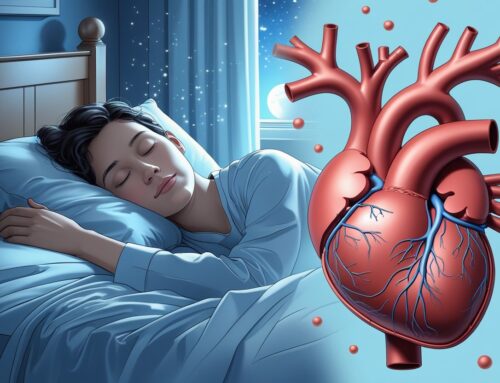Sleep is a vital process that allows the body and mind to recharge. It is a state of reduced mental and physical activity where the body undergoes important restorative functions. During sleep, various stages occur, including REM and NREM, each playing a role in maintaining overall health. Understanding sleep is key to recognizing its importance. Many people underestimate how much sleep impacts daily life, from cognitive function to emotional well-being. A lack of sleep can lead to serious health issues, showcasing the need for adequate rest.
By exploring the different aspects of sleep, individuals can better appreciate its role in a healthy lifestyle. Learning how to improve sleep hygiene and address sleep disorders can enhance one’s sleep quality and overall health.
Key Takeaways
- Sleep is essential for physical and mental restoration.
- Quality sleep influences mood and cognitive performance.
- Proper sleep hygiene can improve overall sleep quality.
- Understanding what is sleep can help in choosing the right mattress, as the right firmness level supports better rest and spinal alignment.

Basics of Sleep
Sleep plays a crucial role in keeping both the body and mind functioning properly. It follows distinct cycles and stages, each contributing to overall health and well-being.
Definition of Sleep
Sleep is a natural state of rest where consciousness is reduced, and responsiveness to external stimuli decreases. During this time, the body undergoes essential processes that aid in healing and restoration. Most people experience sleep by lying down with their eyes closed, creating an environment that promotes relaxation. Unlike hibernation or unconscious states, sleep is easily reversible, allowing individuals to wake up when needed. This process is vital for cognitive function, emotional stability, and physical health.
Sleep Stages
Sleep consists of two primary types: Rapid Eye Movement (REM) sleep and non-REM sleep. Non-REM sleep is further divided into three stages, each serving a unique purpose:
- Stage 1: The lightest sleep stage, lasting only a few minutes, during which a person can wake up easily.
- Stage 2: A deeper stage of sleep lasting about 20 minutes, where heart rate slows and body temperature drops.
- Stage 3: The deepest, most restorative stage, essential for physical recovery. It is much harder to wake someone during this phase.
REM sleep typically occurs about 90 minutes after non-REM sleep begins. This stage is marked by rapid eye movement, heightened brain activity, and vivid dreaming. People cycle through these stages multiple times throughout the night.
Circadian Rhythms
Circadian rhythms are the body’s internal clock, regulating sleep and wake cycles over a 24-hour period. These rhythms are influenced by external factors like light and darkness, which signal when to feel alert or sleepy.
Key factors that impact circadian rhythms include:
- Light exposure: Natural light signals the brain to wake up, while darkness helps prepare for sleep.
- Hormonal changes: Melatonin production increases at night, promoting drowsiness.
- Behavioral habits: Maintaining a consistent sleep schedule strengthens the body’s natural rhythms and improves sleep quality.
By understanding and working with their circadian rhythms, individuals can manage their sleep more effectively, leading to better overall health and well-being.
Sleep plays a crucial role in maintaining overall health, supporting everything from physical restoration to cognitive function and metabolic balance. Understanding these benefits highlights the importance of prioritizing good sleep habits.
Restoration
Sleep is essential for the body’s recovery and repair processes. During deep sleep, muscles rebuild, tissues grow, and proteins essential for healing are synthesized. In addition to physical repair, sleep regulates hormones that influence stress levels and appetite, helping the body maintain a healthy balance. This restorative function ensures individuals wake up refreshed and ready for the day ahead.
The immune system also relies on sleep to function properly. During rest, the body releases cytokines—proteins that help fight infections. Without enough sleep, immune defenses weaken, increasing the risk of illness.
Memory Consolidation
Sleep is critical for memory consolidation, the process that strengthens learning and recall. Throughout the night, the brain organizes and stores information gathered during the day. Certain sleep stages, particularly REM sleep, play a key role in transferring short-term memories into long-term storage. This process enhances the ability to recall information and supports problem-solving skills.
When sleep is disrupted or inadequate, the brain struggles to retain new knowledge, reducing focus and creativity. Consistent sleep improves cognitive function, making it easier to learn, think clearly, and process information efficiently.
Metabolic Health
Metabolism and sleep are closely connected. Poor sleep disrupts hormones that regulate hunger and fullness, increasing appetite and raising the risk of weight gain. Research shows that sleep deprivation can impair insulin sensitivity, making it harder for the body to manage blood sugar levels. Over time, this increases the likelihood of developing type 2 diabetes and other metabolic issues.
By maintaining regular sleep patterns, individuals can support a healthy metabolism, sustain energy levels, and reduce health risks associated with poor sleep. Prioritizing rest is key to overall well-being and long-term health.
Sleep Disorders
Sleep disorders can make it difficult to get the rest needed for a healthy, productive life. Conditions like insomnia, sleep apnea, and restless legs syndrome (RLS) can significantly affect daily well-being, leading to fatigue, mood changes, and health complications.
Insomnia
Insomnia is one of the most common sleep disorders. It can involve trouble falling asleep, staying asleep, or waking up too early without feeling refreshed. People with insomnia often experience daytime tiredness, which can impact their mood, focus, and overall performance. Several factors contribute to insomnia, including stress, anxiety, certain medications, and poor sleep habits like irregular bedtimes.
Treatment varies depending on the cause. Behavioral approaches, such as cognitive-behavioral therapy for insomnia (CBT-I), have proven highly effective. In some cases, medications may be prescribed to assist with sleep.
Sleep Apnea
Sleep apnea is a serious condition in which breathing repeatedly stops and starts during sleep, causing frequent disruptions and leading to excessive daytime drowsiness.
There are two main types:
- Obstructive sleep apnea (OSA): The most common type, caused by throat muscles relaxing too much and blocking the airway.
- Central sleep apnea: A less common type, in which the brain fails to send proper signals to control breathing.
Common symptoms include loud snoring, gasping for air during sleep, and waking up feeling unrefreshed. Diagnosis often requires a sleep study, and treatments can range from lifestyle changes and oral devices to CPAP machines that help maintain airflow.
Restless Legs Syndrome
Restless legs syndrome (RLS) is a condition that causes an uncontrollable urge to move the legs, often due to discomfort such as tingling or crawling sensations. Symptoms tend to worsen in the evening or at night, making it difficult to fall asleep. Many people find temporary relief by moving their legs or walking around. The exact cause of RLS isn’t always clear, but genetics and certain medical conditions may play a role. Treatment options include lifestyle adjustments and, in some cases, medications to help ease symptoms.
Understanding these sleep disorders and seeking appropriate treatment can improve sleep quality, overall health, and daily functioning.
Sleep Hygiene
Sleep hygiene refers to the habits and practices that create the best conditions for restful sleep. It involves optimizing the sleep environment, establishing a consistent bedtime routine, and making mindful dietary choices. Each of these factors plays a key role in improving sleep quality and overall well-being.
Sleep Environment
Creating an ideal sleep setting can significantly improve rest. Key factors include:
- Darkness: A dark room signals the body that it’s time to sleep. Using blackout curtains can help block out unwanted light.
- Quiet: Reducing noise minimizes disruptions. Earplugs or white noise machines can be helpful in creating a peaceful environment.
- Comfortable Temperature: A cool room, ideally between 60-67°F (15-19°C), promotes better sleep. Adjusting bedding can enhance comfort.
- Mattress and Pillows: A supportive mattress and properly chosen pillows contribute to spinal alignment and sleep quality.
A relaxing bedroom atmosphere encourages deeper, more restorative sleep.
Pre-Sleep Routines
A consistent bedtime routine signals the body to prepare for rest. Effective practices include:
- Consistent Sleep Schedule: Going to bed and waking up at the same time each day helps regulate the body’s internal clock.
- Relaxation Techniques: Reading, meditating, or taking a warm bath can help the mind and body unwind.
- Screen Time Limitation: Reducing screen exposure at least an hour before bed minimizes blue light interference with sleep hormones.
These habits create a calming transition into sleep, improving overall restfulness.
Diet and Sleep
Dietary choices can directly influence sleep quality. Important considerations include:
- Avoiding Heavy Meals: Eating large meals too close to bedtime can cause discomfort and disrupt sleep. Lighter dinners are recommended.
- Caffeine and Alcohol: Both substances can interfere with sleep cycles. Limiting their intake, particularly in the evening, is beneficial.
- Sleep-Inducing Foods: Certain foods, such as cherries, bananas, and oatmeal, contain natural compounds that support melatonin production, promoting better sleep.
By adopting mindful eating habits and a structured nighttime routine, individuals can set the stage for more restful and refreshing sleep.
Sleep Requirements
Getting enough sleep is essential for maintaining good health and overall well-being. While sleep requirements vary by age, they can also differ from person to person due to lifestyle, health, and other individual factors.
Sleep Needs by Age Group
Each stage of life comes with specific sleep recommendations. Here’s a breakdown of the ideal hours of sleep per day:
- Newborns (0-3 months): 14-17 hours, including naps throughout the day.
- Infants (4-12 months): 12-16 hours, with multiple naps supporting growth and development.
- Toddlers (1-2 years): 11-14 hours, often with at least one daytime nap.
- Children (3-5 years): 10-13 hours, with some still benefiting from naps.
- School-Age Children (6-13 years): 9-11 hours, typically without naps as sleep consolidates at night.
- Teens (14-17 years): 8-10 hours, which is crucial for cognitive function and physical growth.
- Adults (18-64 years): 7-9 hours, supporting energy levels, concentration, and overall health.
- Older Adults (65+ years): 7-8 hours, though sleep may become lighter and more fragmented with age.
Individual Variability
While these guidelines provide a general framework, individual sleep needs can differ. Several factors can influence how much sleep a person requires:
- Lifestyle: High-stress jobs, physical activity, or irregular schedules may require more rest to maintain balance.
- Health Conditions: Chronic illnesses, anxiety, and depression can impact sleep quality and duration.
- Genetics: Some individuals naturally function well on less sleep, while others need more to feel rested.
- Sleep Quality: A person experiencing frequent wake-ups or restless sleep may require longer sleep periods to compensate.
Paying attention to how you feel after different amounts of sleep can help determine your personal needs. Adjusting sleep habits accordingly ensures better energy levels, focus, and long-term health.
Sleep deprivation can take a serious toll on cognitive function, physical health, and emotional well-being. Without enough rest, the body and mind struggle to function properly, impacting daily life in significant ways.
Cognitive Impairment
Lack of sleep greatly affects cognitive abilities, making it harder to focus, retain information, and make decisions. Memory problems, reduced attention span, and slower reaction times are common consequences. Studies show that problem-solving skills decline, and individuals may struggle with even simple tasks when sleep-deprived.
Additionally, slowed reaction times increase the risk of accidents, particularly when driving or operating machinery. The brain relies on sleep to process information and form new memories, making rest essential for mental sharpness.
Physical Health Consequences
Chronic sleep deprivation is linked to serious health problems, including high blood pressure, diabetes, and heart disease. It also weakens the immune system, making individuals more vulnerable to infections.
Another major effect is its impact on weight. Sleep deprivation disrupts hormones that regulate hunger, often leading to increased cravings for high-calorie foods. Over time, this can contribute to weight gain and other metabolic issues. Long-term sleep loss not only worsens existing health conditions but may also shorten life expectancy.
Emotional and Mental Health
Sleep plays a key role in emotional stability. When deprived of rest, people often become more irritable, stressed, and prone to mood swings. Anxiety and depression symptoms can intensify, making it harder to manage daily challenges. Lack of sleep also affects motivation and emotional regulation, which can lead to strained relationships at work and home. Establishing healthy sleep habits is crucial for mental resilience and maintaining a balanced mood.
Dreaming
Dreams are a fascinating part of sleep, occurring in different stages of the sleep cycle. Researchers explore both the purpose of dreams and various theories about why they happen.
Purpose of Dreams
Dreams may serve several important functions. One major role is emotional processing—helping the brain work through daily experiences and reduce stress. This can lead to better emotional regulation and overall mental well-being. Dreams also appear to strengthen memory. Studies suggest that dreaming helps consolidate new information, improving recall and understanding.
Additionally, dreams can boost creativity. Many artists, writers, and scientists have drawn inspiration from their dreams, demonstrating how the brain makes unique connections during sleep that might not arise while awake.
Dream Theories
There are several theories about why dreams occur.
- Freudian Theory: Sigmund Freud believed that dreams reveal hidden desires and unconscious thoughts, providing insight into the subconscious mind.
- Activation-Synthesis Model: This theory suggests that dreams are the brain’s attempt to make sense of random neural activity during REM sleep. It implies that dreams may not have specific meanings but are simply a byproduct of brain function.
- Memory Consolidation Theory: More recent research suggests that dreams help the brain organize and store memories. During sleep, the brain reviews experiences, reinforcing important memories while discarding less relevant ones.
While the exact purpose of dreams remains a mystery, they play a fascinating role in both mental and emotional processes. Understanding the impact of sleep deprivation and the function of dreams highlights the importance of prioritizing quality rest for overall well-being.
When exploring what sleep is, it’s important to recognize the critical role a mattress plays in achieving restful and restorative sleep. A mattress affects spinal alignment, pressure relief, and overall comfort, making it a key factor in sleep quality. Sleeping on an unsupportive or uncomfortable mattress can lead to aches, disrupted sleep, and long-term health issues.
For those looking to upgrade their sleep experience, the Nolah Evolution 15″ is an excellent choice. This premium hybrid mattress combines pressure-relieving foam, cooling technology, and zoned support to accommodate a wide range of sleep preferences. Its design helps promote deeper sleep by reducing motion transfer and maintaining optimal temperature regulation throughout the night.
Choosing the Best King-Size Mattress
If you’re considering a king-size mattress, here are some essential factors to keep in mind:
- Firmness Level: Side sleepers typically prefer softer mattresses for pressure relief, while back and stomach sleepers benefit from firmer support.
- Material Type: Hybrid mattresses, like the Nolah Evolution 15”, blend foam and coils for enhanced support and durability, whereas memory foam provides contouring comfort.
- Cooling Technology: If you tend to overheat at night, opt for a mattress with breathable materials and cooling layers.
- Motion Isolation: Couples should look for a mattress with excellent motion isolation to minimize disturbances from movement.
- Durability and Warranty: A high-quality mattress should last for years, so consider options with strong warranties and durable construction.
Investing in a well-designed mattress ensures better sleep, improving overall health and daily performance. By choosing the right mattress, you can maximize the benefits of sleep and wake up feeling refreshed and rejuvenated.











